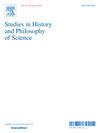Resisting Newton in provincial France, 1750s–1770s: Opposition from the margins to the Parisian academic community
IF 1.8
2区 哲学
Q1 HISTORY & PHILOSOPHY OF SCIENCE
引用次数: 0
Abstract
In the eighteenth century, the requirements for participation in scientific life were progressively narrowed, leading to a gradual closure of the community of the learned. This shift was influenced by the dissemination of Newton's natural philosophy across Europe, which catalysed the rejection of previously dominant principles and methods, while heralding the adoption of a new approach, based on mathematics and experimentalism. This paper examines various forms of resistance to the emergence of a community of Newtonian savants in post-1750 France, focusing on institutions and authors located at its margins. First, I analyse the relationship between provincial and central academies through the case study of the Académie des Belles-Lettres de Caen. Here, the persistent opposition to Newton was partly due to cultural conservatism but was also a form of resistance to the centralisation and concentration of expertise, and the resulting homogenisation of practices, promoted by the Paris Academy. Secondly, I examine the opposition to Newton by some authors working outside the academic milieu, who contributed to the “provincialisation” of knowledge by addressing a provincial public in their writings. Their aim was not only to engage in a dialogue with the savants of the authoritative institutions, which was almost impossible at the time, but also to appear as polemicists on the public stage, attracting a readership thirsty for scientific perspectives alternative to those considered mainstream.
18世纪50年代至70年代法国外省对牛顿的抵制:来自巴黎学术界边缘的反对。
在18世纪,参与科学生活的要求逐渐缩小,导致有学问的群体逐渐关闭。这种转变受到牛顿自然哲学在欧洲传播的影响,它催化了对先前占主导地位的原则和方法的拒绝,同时预示着采用一种基于数学和实验主义的新方法。本文考察了对1750年后法国出现的牛顿学者群体的各种形式的抵制,重点是位于其边缘的机构和作者。首先,本文以卡昂文学学院为例,分析了省级学院与中央学院的关系。在这里,对牛顿的持续反对部分是由于文化保守主义,但也是一种对专业知识集中和集中的抵制形式,以及由此产生的实践同质化,由巴黎学院推动。其次,我考察了一些在学术环境之外工作的作者对牛顿的反对,他们通过在他们的著作中向地方公众发表讲话,促成了知识的“地方化”。他们的目标不仅是与权威机构的学者进行对话,这在当时几乎是不可能的,而且还以辩论家的身份出现在公共舞台上,吸引渴望科学观点的读者,而不是那些被认为是主流的观点。
本文章由计算机程序翻译,如有差异,请以英文原文为准。
求助全文
约1分钟内获得全文
求助全文
来源期刊

Studies in History and Philosophy of Science
管理科学-科学史与科学哲学
CiteScore
2.50
自引率
10.00%
发文量
166
审稿时长
6.6 weeks
期刊介绍:
Studies in History and Philosophy of Science is devoted to the integrated study of the history, philosophy and sociology of the sciences. The editors encourage contributions both in the long-established areas of the history of the sciences and the philosophy of the sciences and in the topical areas of historiography of the sciences, the sciences in relation to gender, culture and society and the sciences in relation to arts. The Journal is international in scope and content and publishes papers from a wide range of countries and cultural traditions.
 求助内容:
求助内容: 应助结果提醒方式:
应助结果提醒方式:


